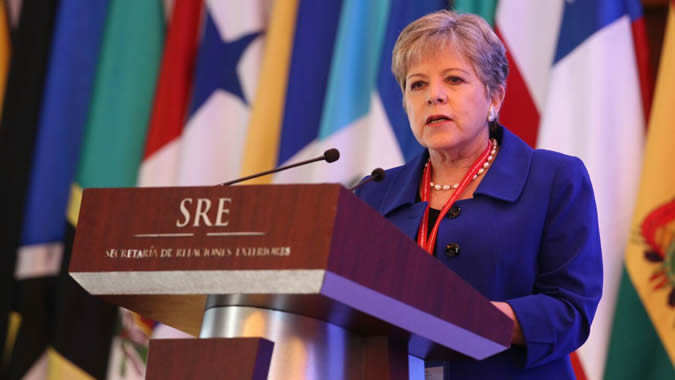The Transit to an Internet Based on Production Is Key for a Development with Equality: ECLAC
Work area(s)
The Fifth Ministerial Conference on the Information Society in Latin America and the Caribbean was inaugurated today and will be held in Mexico City until Friday.

“The intensive use of Internet is essential for the region’s economic growth,” said Alicia Bárcena, ECLAC’s Executive Secretary, who today inaugurated the Fifth Ministerial Conference on the Information Society in Latin America and the Caribbean, along with Mexico’s Secretary of Foreign Affairs, José Antonio Meade; Mexico’s Coordinator of the National Digital Strategy, Alejandra Lagunes, and the Executive Director of the Agency for e-Government and Information Society in Uruguay (AGESIC), José Clastornik.
With the participation of the officials in charge of the digital strategies for the region’s 17 countries, along with members of civil society, the private sector and the technical community, the ministerial meeting organized by the Economic Commission for Latin America and the Caribbean (ECLAC) and the Government of Mexico began today in Mexico City. During the meeting, participants will update the region’s digital agenda looking towards 2018.
In her opening speech, Alicia Bárcena underlined the particular character of the event, which “celebrates the 10 years of the eLAC process, the digital agenda in the region, which ECLAC has had the honor to accompany as its technical secretariat.” The United Nations official underscored the need for the region to integrate the digital revolution through the inclusion of new technologies to the productive structure, considering that “the countries’ capacities to develop the digital economy have a direct impact in their growth,” she said.
According to Bárcena, digital and data revolution represent one of the biggest changes of paradigm at a global level, and both can boost new business models, new public policy tools and new ways of citizen participation based on the digital economy. Joining Alejandra Lagunes, Alicia Bárcena emphazised that the regional agenda eLAC2018 must be transforming and oriented to the Sustainable Developmen Agenda towards 2030 objectives, which main priorities are: people, planet, prosperity, justice and dignity so “no one is left behind”. This paradigmatic change is key to create more supportive societies which will allow them to go from a culture of privilege to a culture of equality with rights in the region.
On his part, José Clastornik, outgoing President of the Regional Plan of Action for the Information Society in Latin America and the Caribbean (eLAC), highlighted the three action plans implemented since 2005, which have pointed to the incorporation of information and communications technologies (ICT) as development tools to reduce the gaps in the region. Clastornik underlined the evolution and continuity of the mechanism and thanked both ECLAC as its technical secretariat and the new presidency, which will go to Mexico.
Alejandra Lagunes stressed that Internet and digital technologies are a powerful tool that will help the region put itself at a leading position for taking on the great development challenges. “The technological evolution has brought enormous benefits and no country can fall behind,” she said. The region should contemplate strategic goals, added Lagunes, who assumed eLAC’s presidency in the name of Mexico.
Mexico’s Secretary of Foreign Affairs, José Antonio Meade, underlined that the access to Internet is essential to constitute a fair information society and that this goal requires active public policies by the region’s countries. He guaranteed that the ministerial work during this week’s conference in Mexico will contribute to close the digital gaps in Latin America and the Caribbean.
Afterwards, ECLAC’s Executive Secretary presented the document The new digital revolution: from the consumer Internet to the industrial Internet, which analyzes the most recent technological trends in the digital sphere (such as big data analytics and the Internet of things), the situation of the region’s countries in matters of access and appropriation of those technologies, and the main areas of international debate that will define the future of Internet and the use of digital technologies.
Bárcena stressed the importance of designing modern systems of regulation, the initiatives for setting standards led by the most advanced countries, the neutrality of the network, the governance of Internet and the protection of online consumer rights. In addition, she said, the State must be the architect of structural change for equality in the region, through industrial policies with digital development as a mechanism of change for achieving more equality and environmental sustainability, together with new ways of collaboration between private sector and civil society actors.
The senior representative explained that the document proposes progressing towards a digital single market in the region that enables generating network and scale economies to compete in relative equality with the main global platforms. This is due to, besides the progresses made in access –in 2014 half of Latin Americans used Internet- the lag of the region with respect to more advanced fixed technologies hinders the usage of border techniques in matter of production, education, health and climate supervision. “To strengthen the processes of investment and innovation, in the framework of a digital single market, is the path proposed by ECLAC,” she said.
Related content

To Compete in the Global Economy the Creation of a Digital Single Market in Latin America and the Caribbean Is Required
ECLAC presents study on the digital revolution in the framework of the Fifth Ministerial Conference on the Information Society being held this week in Mexico City.

Opening of the fifth Ministerial Conference on the Information Society in Latin America and the Caribbean
Remarks by Alicia Bárcena, Executive Secretary of ECLAC.

La nueva revolución digital. De la Internet del consumo a la Internet de la producción
Presentación de Alicia Bárcena, Secretaria Ejecutiva de la CEPAL, en la quinta Conferencia ministerial sobre la sociedad de la información de América Latina y el Caribe.
Subregional headquarter(s) and office(s)
Related link(s)
Country(ies)
- Latin America and the Caribbean
-
Mexico
